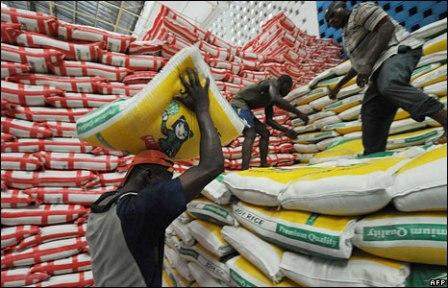
Shipsandports on 2nd April 2015
The Seaport Terminal Operators Association of Nigeria (STOAN) has raised alarm over the continuous diversion of ships laden with rice to the ports of neighbouring countries.
Chairman of STOAN, Princess (Dr.) Vicky Haastrup, said in Lagos yesterday that no fewer than 150 shiploads of rice have been diverted to the ports in Benin Republic, Cameroon, Accra and Togo in the first quarter of this year.
She said Nigeria lost about 600,000 metric tonnes of rice between January and March 2014 to the neighbouring ports due to the 110 per cent policy slammed on the commodity by the Federal Government early 2013.
“This is becoming rather unfortunate. Our economy is bleeding seriously because of this policy. The loss to other countries, as a result of the high tariff on rice was over N300 billion last year while in the first quarter of this year alone, both government and private operators have lost at least N80 billion.
“Even the Federal Government through Minister of Finance and Coordinating Minister of the Economy, Mrs. Ngozi Okonjo-Iweala, admitted the shortcoming of this policy. The truth is that the policy has done more harm than good to our economy and government should waste no further time before reversing it,” Haastrup stated.
According to her, revenues affected by the 110 per cent rice policy include those of the Nigeria Customs Service, terminal operators, dock workers and the Nigerian Ports Authority (NPA).
Haastrup also disagreed with those who blame Customs for the high rate of smuggling of rice into Nigeria.
“It is totally wrong to blame Customs. Customs is doing its very best under the circumstance to check smuggling of rice into the country and that can be seen from the numerous seizures they make every day.
“The fact of the matter is that the policy cannot work. Even if you place heavily armed Customs officers in every corner of our borders, it won’t stop smuggling. It is a fact that local production cannot match local demand which creates a recipe for smuggling. There is a lot of pressure on Customs because the quantity of rice manufactured locally can only satisfy 30 per cent of local demand. It is easy to point accusing fingers but I believe Customs officers are giving their best.
“And don’t forget that our neighbouring countries are profiting from the policy by dropping their own tariffs on rice and because they are benefitting, they give tacit support to these smugglers,” the STOAN Chairman said.
She said the 110 per cent policy will not encourage local production but rather stifle it due to the high rate of smuggling.
Minister of Finance, Dr Ngozi Okonjo-Iweala, last month, said the Federal Government was contemplating a downward review of tariff on imported rice.
Okonjo-Iweala, who disclosed this while answering questions at the ‘Budget 2014 Jam’ in Abuja, said that a drop in tariff would reduce smuggling of the commodity into the country.
The minister said that the existing 110 per cent duty on the importation of rice was encouraging smuggling of the commodity into the country.
“We increased the tariff to110 per cent, and it encouraged some people to go and grow rice and we grew 1.1 million metric tonnes of the product. But it also encouraged smuggling by neighboring countries because they immediately dropped their own tariffs to 10 per cent.
“For rice, we decided to bring it down because we see that it is not working,” she said.
Area Controller, Apapa Command of the Nigeria Customs Service (NCS), Comptroller Charles Edike, told journalists recently that the NCS was losing huge revenue as a result of the hike in rice import duty.
Edike disclosed that the command’s revenue on rice has plunged to an all time low as it has recorded zero income on imported rice since July last year. He the Federal Government rice policy introduced early last year had impacted negatively on the Apapa Command revenue.
“The glory of Apapa Port is rice. The bulk of Apapa revenue is rice but now rice is not coming in at all,” he said.
As a result of the strategy adopted by the neighbouring countries, Nigeria lost all its annual import of two million metric tonnes of rice to them in 2013.
Checks at the Cotonou Port revealed that the port handled an unprecedented 2.2 million metric tonnes of rice in 2013 compared to 650,000 metric tonnes it handled in 2012.
The rice discharged in the ports of neighbouring countries is brought into Nigeria in bits and pieces through the land border to evade payment of duties to government.
